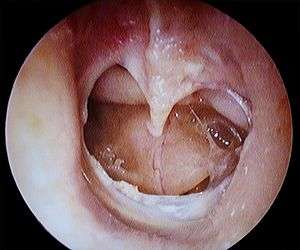Perforated eardrum
| Perforated eardrum | |
|---|---|
 | |
| Classification and external resources | |
| ICD-10 | H72, S09.2 |
| ICD-9-CM | 384.2 |
| DiseasesDB | 13473 |
| MedlinePlus | 001038 |
| eMedicine | ent/206 |
| MeSH | C09.218.903 |
A perforated eardrum or punctured eardrum is a rupture or perforation (hole) of the eardrum which can occur as a result of otitis media (ear infection), trauma (e.g. by trying to clean the ear with sharp instruments), explosion, loud noise or surgery (accidental creation of a rupture). Flying with a severe cold can also cause perforation due to changes in air pressure and blocked eustachian tubes resulting from the cold. This is especially true on landing.
Presentation
Perforation of the eardrum leads to conductive hearing loss, which is usually temporary. Other symptoms may include tinnitus, earache or a discharge of mucus. Throwing up or nausea may occur.[1]
To diagnose a perforated eardrum, a doctor will examine inside the ear with an instrument called an otoscope. This gives a view of the ear canal and eardrum, allowing confirmation of any rupture/perforation.
Treatment
The perforation may heal in a few weeks, or may take up to a few months.[2] Some perforations require intervention. This may take the form of a paper patch to promote healing (a simple procedure by an ear, nose and throat specialist), or surgery (tympanoplasty).[3] However, in some cases, the perforation can last several years and will be unable to heal naturally.
Hearing is usually recovered fully, but chronic infection over a long period may lead to permanent hearing loss. Those with more severe ruptures may need to wear an ear plug to prevent water contact with the ear drum.